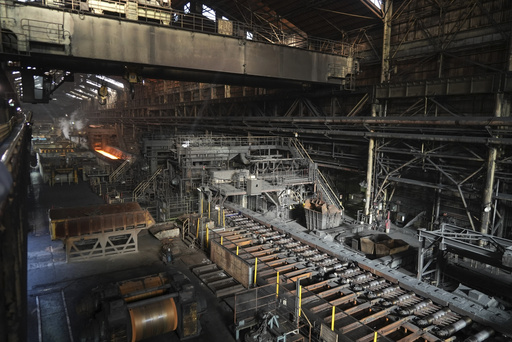KASHIMA, Japan — The message displayed at Nippon Steel declares, “The world through steel,” emphasizing the motivation behind the company’s ambitious $15 billion plan to acquire U.S. Steel.
“With Japan’s population on the decline, we cannot continue to rely on domestic market growth. Our focus must shift toward investments that facilitate expansion,” stated Masato Suzuki, a company representative, during a recent press conference at a steel manufacturing facility in Ibaraki prefecture, situated north of Tokyo.
The leadership at Nippon Steel has their sights set on broader markets, aiming to tap into India, Southeast Asia, and the United States for future growth, as approximately 70% of the plant’s products are destined for export.
Despite facing opposition from significant political figures—including President-elect Donald Trump, President Joe Biden, and American labor groups—Nippon Steel maintains a sense of optimism regarding the acquisition.
During the plant tour, visitors observed intense processes where slabs of steel, glowing at over 1,000 degrees Celsius (1,800 Fahrenheit), were being fashioned into large rolls of ultra-thin steel.
While Nippon Steel representatives were tight-lipped about the specific advanced technologies promised to accompany the acquisition of U.S. Steel, they confirmed that under the proposed agreement, U.S. Steel would retain its name and operational headquarters in Pittsburgh, Pennsylvania, transitioning into a subsidiary of Nippon Steel.
Currently, Nippon Steel operates manufacturing facilities in the United States, Mexico, China, and Southeast Asia, servicing top global automakers—including Toyota Motor Corp.—and producing steel for railroads, pipelines, appliances, and skyscrapers.
The American steel landscape has seen a decline partly due to the rising dominance of Chinese steel producers. Nippon Steel is keen to leverage the longstanding security and political ties between the United States and Japan to facilitate this acquisition amidst an uncertain environment.
In September, a jointly appointed arbitration board from both U.S. Steel and the United Steelworkers indicated that the acquisition could proceed.
However, the United Steelworkers Union, which represents around 1.2 million members, raised concerns regarding the potential for job losses and unfavorable contract conditions.
The union expressed apprehension about Nippon Steel’s strategies for relocating production and voiced national security issues along with the importance of domestic supply chains.
In response to inquiries about their stance, the union highlighted a recent communication to its members, in which they emphasized, “As we navigate this situation, our foremost concern remains the stability of our jobs and the well-being of our communities—not just in the immediate term, but for years to come. Past job losses have instilled a strong resolve within us to advocate for our workforce’s future.”
They underscored, “While Japan stands as a political ally, it is also a competitor, consistently seeking to advance its steel industry to the detriment of our own.”
In its efforts to alleviate concerns, Nippon Steel vowed to honor the legacy of U.S. Steel, committing to protect jobs, pensions, and employee benefits while assuring that there would be no layoffs or plant shutdowns.
Nippon Steel anticipates that the deal could spur nearly $1 billion in economic growth within the first two years, create up to 5,000 construction jobs, and generate approximately $40 million in state and local tax revenue.
William W. Grimes, a political science professor at Boston University, remarked that Nippon Steel’s dedication to maintaining U.S. Steel’s production facilities would be beneficial for the local economy, particularly in the specialty steel sector.
He affirmed that Nippon Steel also committed to investing in technological enhancements for competitiveness.
Grimes noted that there are no military-sensitive technologies that can be transferred from the U.S. to Japan and mentioned that the U.S. depends on steel produced by allied nations like Japan.
“Japanese firms would benefit from early engagement with unions and local officials in future negotiations,” he suggested.


